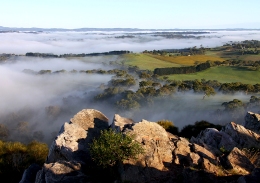31 March 2014
 It may seem fanciful, but the question needs to be asked...could Adelaide’s Mount Lofty Ranges be UNESCO World Heritage listed and still accommodate a thriving economy and community?
It may seem fanciful, but the question needs to be asked...could Adelaide’s Mount Lofty Ranges be UNESCO World Heritage listed and still accommodate a thriving economy and community?
A group of South Australian regional councils and regional development networks are supporting just such a proposition in preparing a World Heritage bid for the agricultural landscapes of the Mount Lofty Ranges.
If the bid is successful, up to 150,000 hectares from the Fleurieu Peninsula to the Barossa Valley will be protected and promoted globally for their heritage, cultural and agricultural assets.
In a special lecture at the University of South Australia’s Hawke Centre, visiting Professor Amareswar Galla, Executive Director of the International Institute for the Inclusive Museum in Copenhagen and senior advisor to the Bali World Culture Forum will argue that given the right structure, places that are heavily integrated into the economic and social fabric of a community, can not only survive heritage listing, but thrive on it.
The lecture - Benefits beyond borders – will be held on Wednesday April 2, from 6pm at the Allan Scott Auditorium, Hawke Building, UniSA City West campus.
Prof Galla will cite the case study of World Heritage site Ha Long Bay in Vietnam to show how diverse people can together reap the benefits from a UNESCO World Heritage listing, including investment, jobs and economic partnerships.
“Traditionally conflicts between conserving rich, but fragile heritage sites while at the same time promoting industrial, economic and tourism development have been treated as ‘either/or’ issues and therefore frequently result in an impasse,” Prof Galla says.
“But good heritage conservation is good business.”
Prof Galla says we cannot afford to put up with more of the same when approaching planning and conservation issues.
“New models and modalities of stakeholder engagement and a deeper understanding of the nexus between heritage conservation and sustainable development are resulting in better dividends for all concerned,” he says.
Prof Galla says ecomuseums and economuseums are examples of processes and practices that have proved especially workable in agricultural landscapes which are inscribed on the World Heritage list.
The two methodologies have been used around the world to bring together communities, craftsmen, industry, environment and local government to build vibrant and viable regions.
Editor of the book World Heritage: Benefits beyond Borders, which marked the 40th anniversary of the World Heritage Convention, Prof Galla’s work on ecomuseology as a tool for sustainable heritage development has won several awards, including the European Best in Heritage Award in 2008.
Prof Galla’s talk, Benefits beyond borders, will be the first of two events focusing on the Mount Lofty Ranges bid.
The second event - UNESCO World Heritage Site status: is there opportunity for economic gain? - is an examination of the socio-economic impact potential of UNESCO World Heritage Site status with James Rebanks and is set for Wednesday 11 June 2014, 5.30pm for 6pm start in the same venue.
You can find more about the lectures online.
Media contact: Michèle Nardelli office: 08 8302 0966 mobile: 0418 823 673 email: Michele.nardelli@unisa.edu.au




